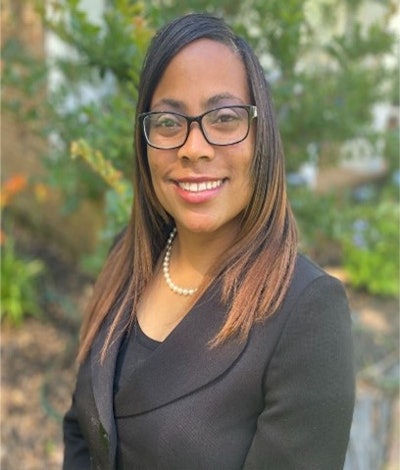“I’m baked. I am well done!” remarks one of our colleagues as we stood in the sweltering heat outside the hallowed halls of Mississippi’s Capital Building in downtown Jackson. The bumpy bus ride from Tougaloo College, Mississippi’s private Historically Black College or University that boasts the production of over 40% of the state’s Black physicians and dentists, is punctuated by a steady flow of thick, balmy air desperately trying to provide relief while obviously in need of a refrigerant top-off. All higher education professionals from HBCUs across the country, we are among the inaugural cohort of Teaching in an Inequitable Society fellows, sponsored by the National Association for the Education of Young Children Black Caucus and the Institute for the Study of Modern-Day Slavery at Tougaloo College. The fellowship seeks to deepen the knowledge and skills of the participants through cultural self-reflection to examine intersectionalities associated with race, curricular practices, and the role of Black and Brown women in the foundational underpinnings of the childcare field. We’d just completed a tour of Mississippi’s historic grandiose Capital building chambers when cell phones vibrated, alerting us of the first grim headline.
News of the passing of Christine King Farris, the last of Dr. Martin Luther King’s living siblings, at the age of 95 sent the first flame of emotions throughout our group. Meanwhile, the Supreme Court’s landmark decision gutting the use of race in college admissions was the quintessential torch to our collective hearts, leaving us disheartened and concerned for our students’ futures. Damn. Well done, SCOTUS.
Affirmative Action in Mississippi
Affirmative action has long been a tool for addressing historical injustices in education. In 1996, affirmative action was struck down by the U.S. 5th Circuit Court of Appeals in Hopwood v. Texas, a case often referred to as the “beginning of the end of affirmative action in higher education.” The state’s Republican Governor, Tate Reeves, supported the Supreme Court’s ruling citing his agreement with Justice Clarence Thomas’s stance. “And their race is not to blame for everything—good or bad—that happens in their lives. Justice Thomas got it right. Race-based college admissions are wrong,” Reeves stated.
Jackson native and NAACP President Derrick Johnson, a Yale Law School graduate, condemned the Supreme Court’s decision while singling out Justice Thomas. “The worst thing about affirmative action is that it created a Clarence Thomas, who benefited from the program and now is in a position where he’s going to deny many young African American talented individuals an opportunity,” Johnson said.
HBCUs
Tougaloo College, founded in 1869, is the oldest of the state’s seven HBCUs established to educate newly freed enslaved individuals. During the Civil Rights Movement, Mississippi’s HBCUs became centers of activism and resistance against racial segregation. However, these institutions have historically been grossly underfunded while doing the lion’s share of work in creating the state’s Black middle class. With concerted legislative efforts nationwide aimed at eliminating race-conscious education, we must seek to understand how state and federal funding for HBCUs can be justified when race-based admissions have been abolished. Further, having always been non-discriminatory in their admissions, HBCUs will need insulation from litigation aimed at challenging their DEI programming, race-conscious admissions, and equitable funding. How will we answer the call?
As HBCU professors from across the country, we keenly understand the weight of this ruling. And while the focus of the fellowship and our time at Tougaloo College in Jackson, MS, is centered on the state's history, legislation, and future of early childhood education, it is not lost on us how this historic decision will impact the class of 2036---this year’s kindergarten class.
To the Supreme Court, we say, “Well done.” But not in celebration of their decision. Instead, we say it as a reminder that our commitment to justice and equity remains steadfast, the work will continue, and our resolve is unwavering. We will remind children they possess the brilliance to be admitted into any institution while advocating against unfair legacy and standardized test-based admissions policies. Allies don’t need legislation to practice fair, equitable, and common-sense humanity as much as legislation will not change the nature of a bigot’s heart. There never should have been a need for affirmative action in the first place, as we bear witness to the brilliance, resilience, and grit of underrepresented students at our institutions every day. We have done this work for many years with fewer resources, less infrastructure, and a hell of a lot of love. In the sizzling aftermath of this decision, we are resolved that true justice is not served “well done” but rather medium-rare, inclusive, and accessible to all.
Dr. Cheron H. Davis is an associate professor of reading education at Florida A&M University. Named among Diverse Issues 2022 Top 25 Women in Higher Education, Davis’s research interests include teacher preparation at HBCUs, the promotion of equity and justice through literacy, and early literacy intervention techniques.
Dr. Roshunda Harris-Allen is an associate professor of education and coordinator of child development and master’s degree programs in the Division of Education, Supervision, and Instruction at Tougaloo College in Tougaloo, Mississippi. Harris-Allen serves as the director of the Institute for the Study of Modern-Day Slavery.















